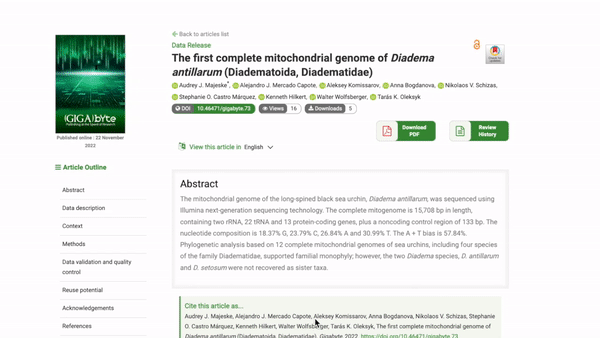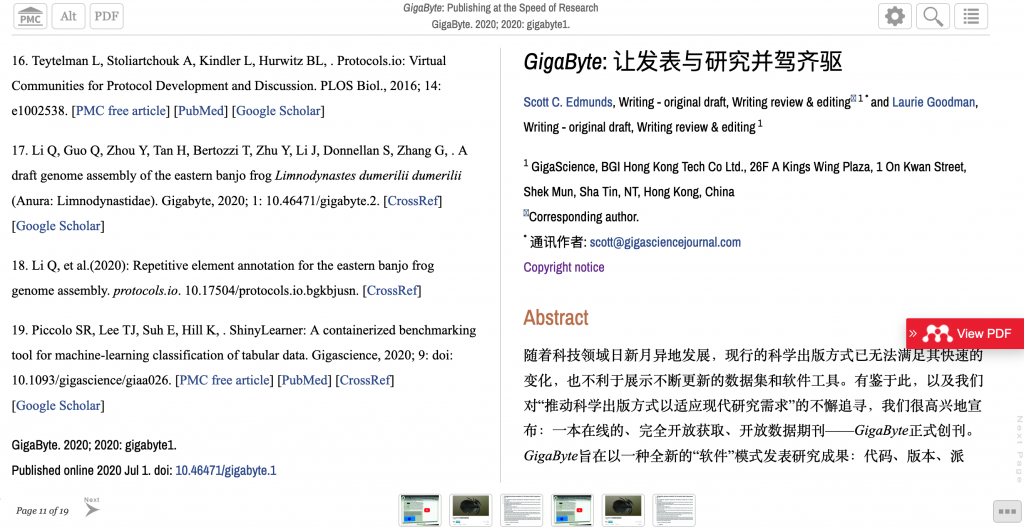The first English-Spanish-Ukrainian Publication. How to publish multilingual articles with GigaByte

In another first for the novel GigaByte publication platform developed by River Valley Technologies, this week marks the first time multilingual articles have been simultaneously published in English, Spanish and Ukrainian
Open Science has gained momentum over the past decade, and embracing that, GigaScience Press has aimed at pushing scientific publishing beyond just making articles open access toward making the entire process open and accessible to the research community and public (see our recent Editorial). In November 2021 UNESCO ratified and published their Recommendation on Open Science, defining the core values of open science including the collective benefit as a global public good. Stating open science should benefit humanity as a whole, and that scientific knowledge should be openly available and its benefits universally shared. The practice of science should be inclusive, sustainable and equitable.
One of the many areas of action highlighted here is encouraging multilingualism in the practice of science, as most international scientific communication is carried out in English, which for the majority of the world and a large proportion of scholars is not their primary language. By allowing multiple views, the novel GigaByte publishing platform developed by our partners at River Valley Technologies has addressed the accessibility issue by showcasing dual versions of our publications in Chinese, Spanish and Portuguese. We’ve also made sure to promote and use AfricArXiv and SciELO preprints, and link them to relevant GigaByte papers published by authors in Africa and Latin America. This novel, more accessible way of presenting our research has already been utilised by the many Latin-American authors of our vectors of human disease series, but this is the first time we have showcased more than one additional language, as well as the first time we have published papers in a Cyrillic script. This multilingual articles functionality was one of the main features we presented to the judges when GigaByte won the 2022 ALPSP Award for Innovation in Publishing.
Glory to Ukrainian and Puerto Rican Science
This week we are showcasing our first example of a trilingual publication; authors from the University of Puerto Rico at Mayagüez, Oakland University in the US, ITMO University in Russia and Uzhhorod National University in Ukraine publishing the mitochondrial genome of the long-spined black sea urchin simultaneously in English, Spanish and Ukrainian. Greatly increasing the accessibility of the work to readers where the species is endemic (and currently undergoing a worrying die-off) in Latin America and the Caribbean. As well as the Ukrainian research community spread around the world as their institutes, homes, and infrastructure are being destroyed in the current Russian invasion of Ukraine. To further increase the discoverability to Spanish speakers the preprint of the paper is also available in SciELO preprints.

To toggle between the different languages you can select and switch them using “View this article in…” link situated just above the abstract on the full-text version of the paper. If there are any problems viewing this just reset the browser cache and try again. English is the “version of record” used to create the PDF version, but the multilingual versions are included in the XML so they are machine readable, and the multilingual versions are all included in the version shared with PubMed Central, and can be read from the PMC versions of our papers now they are being ingested there.

How to Utilise GigaByte’s Multilingual Functionality
Using the newly published paper as an example we can talk through the process of submitting and publishing a multilingual version of your article with GigaByte. English is the primary version of the manuscript we peer review, but if you have versions of your work translated into any other language we are happy to publish these alongside the primary “version of record”. Due to the current unreliability of automatic translations we want the author to provide manually translated and carefully checked versions of the work, and these should be included as supplemental files submitted through our publication system alongside the primary English language version. With details in the covering letter and the files labelled to explain which language they are.
Authors from countries where English is not their first language often write the paper first in their native tongue and then translate it into English, and this approach of publishing both versions means that original effort is not wasted. To ensure there are no inconsistencies between versions, after peer-review the Editors will share the final copy-edited version of the paper with the authors, and they should make sure they update and add any of these final changes the multilingual versions. The GigaByte Editors will then formally accept the paper and send the one or more multilingual versions through to our Editorial Production team, who will then work from the English version in the proofing process, and create parallel versions in the different additional languages. The unique XML-first publishing workflow from River Valley Technologies, that through automation can carry out proofing in less than a day, enables these additional versions to be created in not much additional time.
As all GigaByte papers are linked to preprints, we recommend that Spanish and Portuguese language papers are submitted to the SciELO preprint server to increase discoverability there. And there are a number of other preprint servers have a geographical and language focus (e.g. AfricArXiv, ChinaXiv, Jxiv, etc.) that can also help assist and promote readership to non-English speaking communities.
Please contact the GigaByte Editors at editorial@gigabytejournal.com if you have any questions or multilingual articles to submit.
Further Reading:
Audrey J. Majeske, Alejandro J. Mercado Capote, Aleksey Komissarov, Anna Bogdanova, Nikolaos V. Schizas, Stephanie O. Castro Márquez, Kenneth Hilkert, Walter Wolfsberger, Tarás K. Oleksyk, The first complete mitochondrial genome of Diadema antillarum (Diadematoida, Diadematidae), Gigabyte, 2022 https://doi.org/10.46471/gigabyte.73